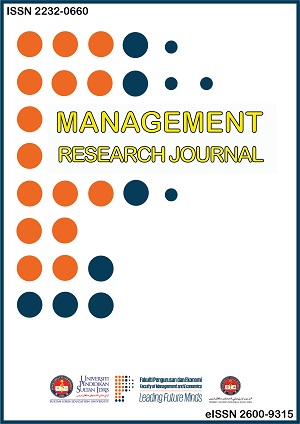Exploring the Impact of Social Media Marketing on Malaysia’s Food Truck Industry
DOI:
https://doi.org/10.37134/mrj.vol13.1.9.2024Keywords:
Food Truck, Technology Acceptence Model, Social Media, Perceived UsefulnessAbstract
This study examines the effectiveness of social media as a marketing tool in Malaysia’s rapidly growing food truck industry. Given the widespread adoption of digital platforms, understanding the dynamics that enhance social media’s effectiveness in marketing has become crucial. This research specifically investigates the relationship between the perceived usefulness of social media and key factors such as informativeness, credibility, hedonic value, and co-creation value. Data were collected from 201 Malaysian social media users interacting with food truck businesses using a quantitative survey method. Analytical methods included descriptive statistics, Pearson’s correlation, multiple regression analysis, and ANOVA tests to assess the impact of demographic variables on perceived usefulness. The findings highlight that informativeness and credibility are critical drivers of perceived usefulness in social media marketing. The results support the Technology Acceptance Model (TAM), suggesting that effective social media marketing strategies should focus on enhancing the quality and reliability of content to foster consumer engagement. This study offers practical insights for food truck owners on optimizing social media usage to attract and retain customers effectively. It also identifies future research directions, emphasizing the need for a broader demographic approach and exploration of emerging digital marketing trends. This research contributes to academic literature and practical marketing strategies, guiding food truck businesses to leverage digital platforms for enhanced market engagement and growth.
Downloads
References
Ahmad, A., Rahman, O. & Khan, M.N. (2017), "Exploring the role of website quality and hedonism in the formation of e-satisfaction and e-loyalty: Evidence from internet users in India", Journal of Research in Interactive Marketing, Vol. 11 No. 3, pp. 246-267. https://doi.org/10.1108/JRIM-04-2017-0022
Alalwan, A. A., Rana, N. P., Dwivedi, Y. K., & Algharabat, R. (2017). Social media in marketing: A review and analysis of the existing literature. Telematics and Informatics, 34(7), 1177–1190. https://doi.org/10.1016/j.tele.2017.05.008
Ceyhan, A. (2019). The impact of perception related social media marketing applications on consumers’ brand loyalty and purchase intention. Emerging Markets Journal, 9(1), 88–100. https://doi.org/10.5195/emaj.2019.173
Cheung, M. L., Luo, C., Sia, C. L., & Chen, H. (2009). Credibility of Electronic Word-of-Mouth: Informational and normative determinants of on-line consumer recommendations. International Journal of Electronic Commerce, 13(4), 9–38. https://doi.org/10.2753/jec1086-4415130402
Davis, F.D. (1989). Perceived usefulness, perceived ease of use, and user acceptance of information technology. MIS Quarterly, 13(3), 319-340.
Gaber, H. R., Wright, L. T., & Kooli, K. (2019). Consumer attitudes towards Instagram advertisements in Egypt: The role of the perceived advertising value and personalization. Cogent Business & Management, 6(1). https://doi.org/10.1080/23311975.2019.1618431
Kaplan, A., & Haenlein, M. (2010). Users of the world, unite! The challenges and opportunities of Social Media. Business Horizons, 53(1), 59–68. https://doi.org/10.1016/j.bushor.2009.09.003
Pintado, T., Sánchez, J., García, S. C., & Alameda, D. M. (2017). The effects of digital media advertising content on message acceptance or rejection: brand trust as a moderating factor. Journal of Internet Commerce, 16(4), 364–384. https://doi.org/10.1080/15332861.2017.1396079
Tafesse, W., & Wien, A. H. (2018). Implementing social media marketing strategically: an empirical assessment. MM. Journal Of Marketing Management, 34(9–10), 732–749. https://doi.org/10.1080/0267257x.2018.1482365
Vargo, S. L., & Lusch, R. F. (2007). Service-dominant logic: continuing the evolution. Journal of the Academy of Marketing Science, 36(1), 1–10. https://doi.org/10.1007/s11747-007-0069-6
Downloads
Published
How to Cite
Issue
Section
License
Copyright (c) 2024 Jastini Mohd Jamil, Izwan Nizal Mohd Shaharanee, Aifaa Zaffan Bagauddin Abdul Aziz

This work is licensed under a Creative Commons Attribution-NonCommercial-ShareAlike 4.0 International License.





